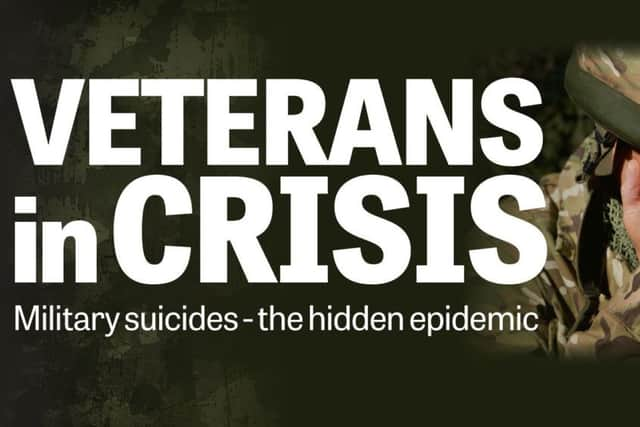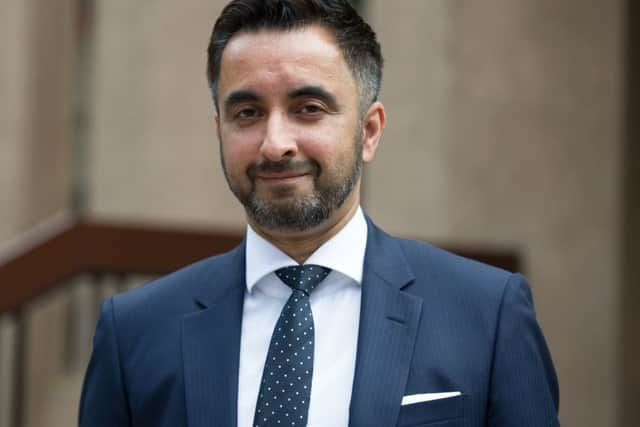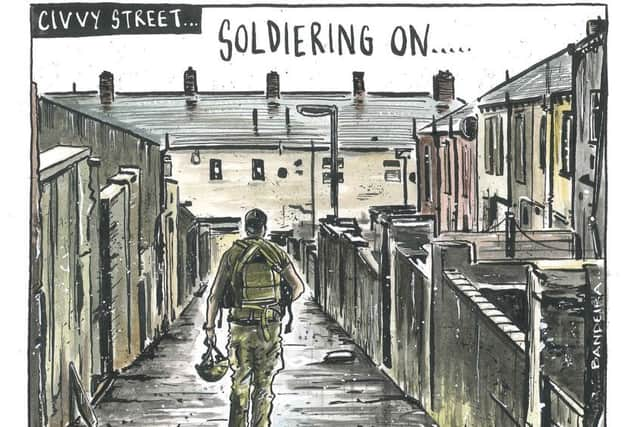Hidden epidemic of veteran suicides 'smacks of cover-up'
and live on Freeview channel 276
Figures for former service personnel taking their own lives – available to the Scottish and Westminster Governments – are withheld from scrutiny by the general public.
Campaigners warn the numbers are set to rise with the country facing a “ticking timebomb” of veterans with PTSD and mental health issues becoming increasingly affected by memories of their experiences in conflicts such as Northern Ireland, Bosnia, Iraq and Afghanistan.
Advertisement
Hide AdAdvertisement
Hide AdEach year approximately 18,000 service personnel leave the UK Armed Forces. Scotland has around 240,000 veterans.


While the majority manage to integrate back into civilian life without major difficulties, a “significant minority” do not.
Human rights solicitor Aamer Anwar is calling for the Scottish and Westminster Governments to carry out an immediate review and release figures on veterans’ suicide rates.
Mr Anwar said: “It’s an absolute disgrace that figures are available to governments but are kept hidden. It smacks of an official cover-up.
Advertisement
Hide AdAdvertisement
Hide Ad“I suspect the figures are deeply embarrassing which is why they are hiding them, being obstructive and refusing to release them.


“They know the finger of blame would rightly be pointed at them for neglecting veterans who end up jobless, homeless and without real medical support.
“I also don’t buy the official explanation that the figures are withheld for reasons of confidentiality.
“The truth is they would make shocking reading.
“It’s horrifying that men and women who put their lives on the line to fight for their country and are saluted by government ministers at ceremonial occasions are put on the scrap heap when they return to civilian life.


Advertisement
Hide AdAdvertisement
Hide Ad“It’s all very well lauding them when they return from wars and conflicts but then most people walk past them when they end up homeless.
“There’s no point in governments sending men and women into conflicts saying ‘we support you every step of the way’ and then turning their back on them.
“That shows their lack of concern and respect for veterans.”
In Scotland, as elsewhere in the UK, those attempting to access the data on veteran suicides face a labyrinthine task involving multiple agencies and bureaucratic barriers.
Advertisement
Hide AdAdvertisement
Hide AdThe Crown Office and Procurator Fiscal Service (COPFS) said it was unable to provide statistics on veteran suicides in Scotland after our Freedom of Information request – because the costs of obtaining data crossed the £600 public authorities threshold.
COPFS said the only way of ascertaining if it held information on veteran deaths from 2015 to 2017 would be to manually examine thousands of death reports – there were 10,931 deaths in Scotland in 2016-2017 alone.
Furthermore, only bona fide academic researchers can apply for permission to access parts of anonymised data on suicides.
Graeme Dey, MSP, who took over as Veterans Minister last month, said the government is investigating ways of linking up with data from the NHS on veterans.
Advertisement
Hide AdAdvertisement
Hide AdHe explained: “The Scottish Government is working closely with the Information Services Division (ISD) of NHS Scotland to explore and improve the collection of data on veterans and have contact with NHS mental health services.
“Once established, this information will then be used to highlight those who are at risk and what support they need.
“Our new suicide prevention action plan will also set out more detail on actions to support suicide prevention in the general population, which includes veterans.”
However, he said it would not be possible to list “veteran” on death certificates or include it in Scottish suicide statistics.
Advertisement
Hide AdAdvertisement
Hide Ad“National Records of Scotland currently collects information on occupations of the deceased which, if the person has served in the armed forces, will reflect veteran status,” he said.
“However, this is only if this was their last paid occupation. It would not capture people who were conscripted in earlier wars or did national service.
“Beyond this, there isn’t a way to reflect veteran status on an extract from the death register.”
The Scottish Government funds the Scottish Suicide Information Database (ScotSID), hosted by ISD, which contains the death records of all probable suicides in Scotland from January 2009.
Advertisement
Hide AdAdvertisement
Hide AdAnd it is now exploring with ISD how data from the NHS central register - which includes an option to record data on armed forces enlistment and discharge - can be transferred to ScotSID to help identify veterans.
Mr Dey added: “This information could then be included in future publications of ScotSID from 2019.”
Lee Knifton, head of Mental Health Foundation Scotland, the mental health campaigning charity, said accurate statistics on veterans’ suicides were vital.
He said: “If we were clearer about the scale of suicide among veterans – and indeed other professions – it would help to better inform suicide prevention strategies.
Advertisement
Hide AdAdvertisement
Hide Ad“Understanding the data is crucial if we are to target key at risk groups.
“Post Traumatic Stress Disorder (PTSD), depression, anxiety and substance abuse affect a significant minority of service personnel and veterans.
“Younger veterans are at high risk of suicide in the first two years after leaving.
“Yet only half of UK veterans experiencing mental health problems sought help from the NHS and those that did were rarely referred to specialist mental health services.”
Advertisement
Hide AdAdvertisement
Hide AdHowever, Lee is hopeful that things may change for the better in future.
He added: “Over the past year we’ve been engaging with the Scottish Government about the delivery of a radical and ambitious new suicide prevention action plan.
“One of our key asks is the creation of a new national body with teeth and resource to drive forward suicide prevention work.
“One of the body’s remits could be to improve the use of evidence, data and guidance on suicide prevention and make recommendations on improving recording methods.”